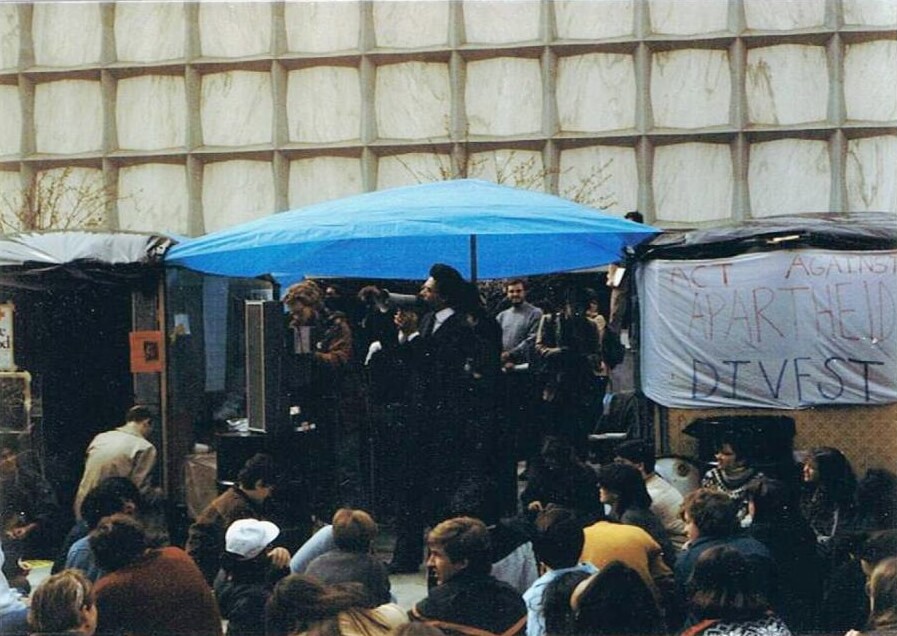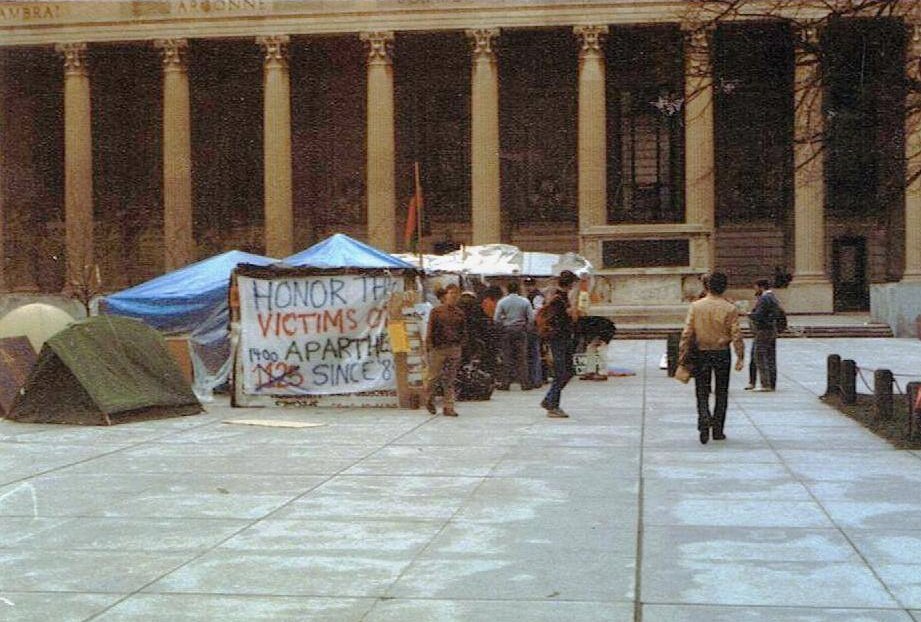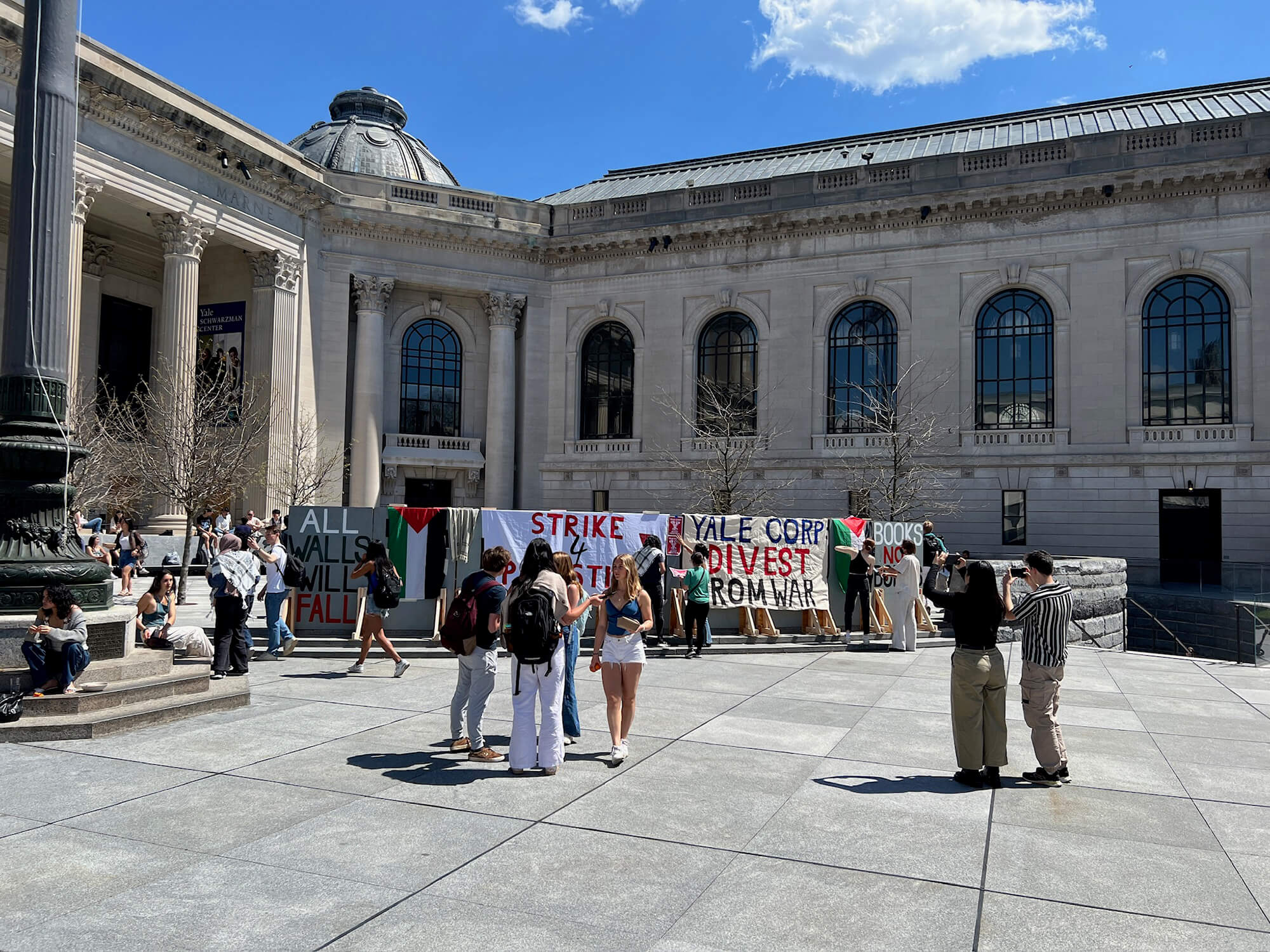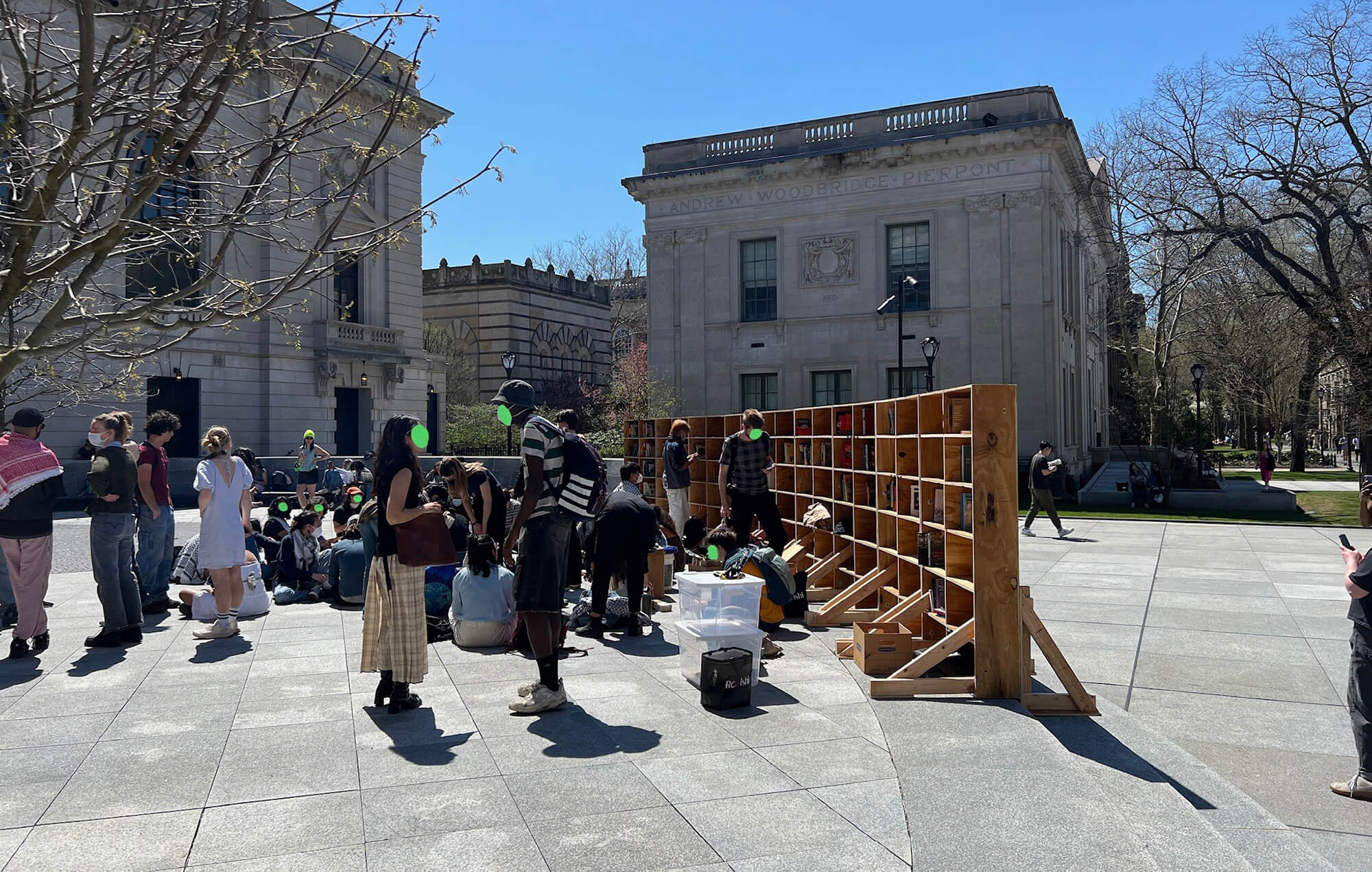Gordon Bunshaft’s Beinecke Library at Yale University is well known to architects—the 1963 building’s translucent granite facade appears in coffee table books around the world. But the iconic building’s exterior, Beinecke Plaza, has a special place in the hearts of social justice activists that many architects may be less familiar with. In 1969, Claes Oldenburg famously installed Lipstick there to protest the Vietnam War and, ever since, numerous activists have held court in Beinecke Plaza to raise awareness about issues from South Africa to Palestine.
Last week, Yalies installed a pop-up library in Beinecke Plaza, otherwise known as Hewitt Quadrangle, for a protest called “Books Not Bombs.” The pop-up featured multiple bookshelves stocked with anti-colonial literature arranged in a manner that followed the plaza’s curvature. Handwritten banners adorned the shelves with messages like “ALL WALLS WILL FALL.” The intervention was designed to support students and faculty on strike for Palestine.
The pop-up library was built just days before Yale Corporation, the governing body of Yale University, meets for their annual endowment review. There, Yale officials discuss the university’s stock holdings—a $40.7 billion portfolio which student activists have criticized for investing in arms manufacturers who sell weapons to Israel. Students have since sent over 1,800 letters to university president Peter Salovey for greater endowment transparency and divestment from the arms industry, an initiative partially led by campus groups called Yalies4Palestine and Yale Endowment Justice Coalition.
“These are anti-war protests,” said Mahdi Sabbagh, a Palestinian PhD student at Columbia University who previously studied architecture at Yale. “There’s a huge discrepancy today between how students and the public feel about the genocide in Gaza, and the actions that university officials and politicians are taking. Students are refusing to be silenced,” Sabbagh told AN. “Architecture students are always encouraged to learn from history and that’s exactly what they’re doing: Learning from past anti-war movements and protesting for divestment.”

Beinecke Plaza has a long history of student activism. In 1990, then Yale professor Dr. Cornel West took his megaphone and gave myriad impassioned calls there for the Ivy League university to boycott apartheid South Africa. At the time, Yale officials condemned the apartheid regime, but refused to divest from South African businesses. In return, Dr. West and his comrades took to Beinecke Plaza calling for total divestment.
Four years earlier, in 1986, anti-apartheid activists occupied Beinecke Plaza, and renamed it Winnie Mandela City, after Nelson Mandela’s wife. That outpost was designed to mimic “shanties” in Soweto (the source of its nickname, Shantytown) and consisted of a few tents clad with signs that had messages like “HONOR THE VICTIMS” and “ACT AGAINST APARTHEID.” Construction workers from Local 35 were ordered to dismantle Winnie Mandela City after it was first built in 1986 but they refused. Non-union campus staffers demolished it shortly after.
Winnie Mandela City was torn down after just a few days, but students quickly returned to the site, much like the events this past week. Winnie Mandela City was subsequently rebuilt and stayed at Beinecke Plaza for the next two years until 1988, when a disgruntled Yale alumnus at his 30th reunion, Dr. Elwood D. Bracey, set the encampment on fire. One Yalie sympathized with Dr. Bracey’s actions, calling Winnie Mandela City “an architectural outrage on a beautiful campus.” Not long after, Yale divested its holdings in South Africa in the 1990s. And to make amends, the corner of College and Chapel Streets was renamed Bishop Desmond Tutu Corner.

These past few months, students have held peace vigils at Beinecke Plaza for Gaza, but those have been regularly disrupted by campus police. The idea for a pop-up library emerged from this activity, when campus protest groups began ideating a pavilion in the same vein as anti-apartheid occupations that were built there in the 1980s. In total, about 20 students were involved the library’s design and planning, and over 40 participated in its assembly at Beinecke Plaza.
The temporary installation was placed on site Monday, April 15. But to the dismay of organizers, it was removed from Beinecke Plaza the next day. Despite its removal, books remained on the ground in what organizers called a “shelfless library,” along with dozens of students participating in a hunger strike. On April 17, Columbia University students also built a pop-up encampment in solidarity with Palestine in Morningside Heights known today as the Gaza Solidarity Encampment.
“Settler-colonialism has always been distinctly architectural. The occupation of Palestine, the apartheid, these are enacted and maintained through architecture as much as through armaments,” said Ada Newman-Plotnick, an M.Arch candidate and organizer for The Architecture Lobby. “The Beinecke Plaza installation created space for a community library in the brief time it stood, until the university dismantled it just like they did to the first incarnation of the Yale shantytown that protested ties to apartheid South Africa,” Newman-Plotnick told AN.

Yale students continued to occupy Beinecke Plaza over the weekend, and more occupations ensued at universities around the U.S., including University of Michigan, Harvard, and others. In Manhattan, over 100 Columbia University students were arrested and many were swiftly suspended, including Isra Hirsi, the daughter of Representative Ilhan Omar.
On the evening of Sunday, April 21, over 600 students occupied Beinecke Plaza. Previously, the administration said it would not arrest students. That stood true until 6:40 a.m. Monday morning, when Yale Campus Police arrested 47 students. By 8:00 a.m. Yale Campus Police were actively dismantling the tents. Shortly after, Yale added a new rule, University Policy on Structures, that forbids installations without the administration’s approval.
“The university made the decision to arrest those individuals who would not leave the Plaza with the safety and security of the entire Yale community in mind and to allow access to university facilities by all members of our community,” a Yale spokesperson told AN. “Yesterday, President Peter Salovey sent a message to the community, noting that the university would not tolerate behavior that interfered with university operations or threatened, harassed, or intimidated others.”

Today, student activists like Newman-Plotnick see parallels between Yale’s involvement in apartheid South Africa and its current investment practices in Israel. As of Yale’s November 2023 SEC filings, the university has 6,500 shares of iShares Core S&P Total U.S. Stock Market ETF, according to Yale Daily News. The Blackrock-managed fund currently invests in weapons manufacturers such as Boeing, Lockheed Martin, and Raytheon that sell to Israel.
“We should remain focused on what these protests are about: Students calling upon the administration to recognize Palestinian rights and to divest from weapons manufacturers,” said Jordan Carver, a professor at Yale School of Architecture. “Students are enacting actual politics of change, performing their own forms of care,” Carver continued, “their own forms of mutual aid; they’re doing the work necessary to bring light to these issues.”
For Carver, the protests at Yale, Columbia, and across the country have provoked essential questions. “Large numbers of students are participating in these protests, Palestinians, Muslims, Jews, students of many genders, races, ethnicities, ages, classes, and abilities. The conversation about these protests should be on the fact that the university invests in weapons systems that are killing people, not just in occupied Palestine, but all over the world.”

